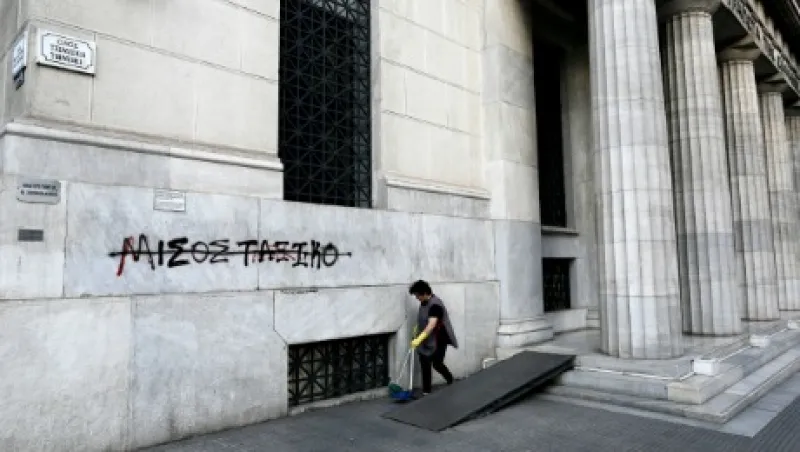Greece woke up this morning to capital controls and a holiday for banks and the Athens exchange after the Syriza-led government elected to choose a referendum next weekend over an outright acceptance or rejection of its creditors’ terms. The market reaction has been dramatic. German Bunds have risen sharply as investors, lulled by the near constant back-and-forth rhetoric between Athens and Brussels, suddenly faces the reality of a possible worst-case scenario. German ten-year sovereign debt yields compressed by more than 20 basis points in trading early today as equities sold off throughout the Continent. The rapidly deteriorating situation threatens to raise market volatility and pull portfolio managers back to their screens prematurely.
Puerto Rico to seek a deal with creditors. Puerto Rico’s governor Alejandro García Padilla stated bluntly that the commonwealth will be unable to meet its debt obligations, in excess of $72 billion. Padilla will address his constituents today at 5 pm local time to discuss the crisis two days before the end of the fiscal year. As a nonstate, the island territory does not have the legal recourse to bankruptcy protection, nor does it possess implicit backing by the federal government, making any restructuring subject to complex negotiations. The majority of the commonwealth’s debt is publicly held in mutual funds and private accounts.
Dudley says September rate hike likely. In an interview in the Financial Times that ran over the weekend, New York Federal Reserve Bank President William Dudley commented that an initial tightening move by the Federal Open Market Committee in September is likely, adding that ant raise could be delayed by soft fundamental data. While noncommittal on the exact timing Dudley expressed confidence that barring a significant economic setback, the Fed would act before the end of the year.
Chinese equities enter correction. After sliding by more than 3 percent in trading this morning, the Shanghai Composite Index reached a level 22 percent lower than the high reached earlier this month. Many analysts consider a retreat of 20 percent or greater as the technical definition of a correction. Some market observers have ascribed this rapid pullback to valuations simply having gotten ahead of themselves. In a note to clients on Monday, Waverly Advisors strategist Adam Grimes commented, “The stunning decline in China is a reflection of specific market dynamics, constraints, and investor psychology in that market,” adding, “do not extrapolate this move and expect it to have far-reaching significance.” Grimes added that Hong Kong-listed equities may be nearing a low point, making this an attractive time to enter that market. Separately, local media sources are reporting that the China Securities Regulatory Commission is meeting with banks and brokers today to discuss a temporary suspension of initial public offerings in a move to mute volatility.
GE to sell units. General Electric announced today that one of the first transactions in its recently announced massive divestiture program is about to get underway. The company has agreed to offload as agreed to sell its fleet financing business units in the U.S., Mexico, Australia and New Zealand to Element Financial Corporation of Canada for $6.9 billion. Separately, GE signed a memorandum of understanding for a sale of its European fleet franchise to Arval, a division of BNP Paribas and an alliance partner of Element, for an undisclosed amount.
China zeroes in on SOEs. On Sunday, the National Audit Office, a China governmental watchdog agency, announced that it was investigating falsified financial statements at 14 state-owned-enterprises, a dramatic development in the ongoing campaign by authorities in Beijing to root out corruption. The movement, spearheaded by President Xi Jinping, has to-date snared more than 100,000 individual political and business leaders in a process that has allowed the government to simultaneously curb graft and consolidate political power.
Portfolio Perspective: Complacent Investors Caught Off Guard by Greece — François Cabau, Barclays
Greek Prime Minister Alexis Tsipras surprised everyone by calling for a referendum to be held on July 5. The referendum will ask the Greeks whether or not they accept the latest proposal presented by the institutions holding the nation’s debt. The Greek government supports a no vote. This surprising decision comes after meaningful progress had been achieved over the past two weeks on reform measures that would unlock the remaining funds of the second, €7.2 billion ($8 billion), bailout. Most policymakers and markets expected that a deal on a program extension was within reach before the current one expires tomorrow. As our latest Barclays client survey suggests, markets have been complacent about Greek risk. A majority of investors believe that a Greek exit from the euro will be a small negative for markets, and only 23 percent expect a Greek exit to happen within the next three months. While there is still a slight chance that the referendum is called off if it is found unconstitutional, we think that this is unlikely.
A victory for a yes vote may trigger a national-unity government. In the event of a yes vote, we think that it is highly likely that Greek Prime Minister Tsipras and possibly the entire government would step down, even if other options are also possible, such as Tsipras staying in power and accepting the deal with the institutions. After Tsipras steps down, moderate Syriza parliament members could join other moderate parties such as PASOK, Potami and ND into a national unity coalition. The new government would reengage with the institutions to sign an agreement as per the mandate given by the referendum. Snap elections would remain a possibility in this scenario, but probably not until after the summer. Market reaction would likely be positive immediately after the referendum. Volatility is likely to remain elevated, however, until a new and stable government is put in place and a program is approved.
A no vote would make an exit the most likely outcome. Without the support of a program, a potential exit scenario would resemble Argentina’s 2001-’02 crisis, which also started with deposit controls but — in the absence of an internationally supported plan — rapidly deteriorated into tighter controls and a forced currency conversion. We believe that European institutions would need to respond to this scenario with a strong institutional-reform agenda, otherwise redenomination risk could reemerge.
François Cabau is an economist with Barclays in London.






